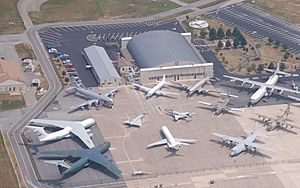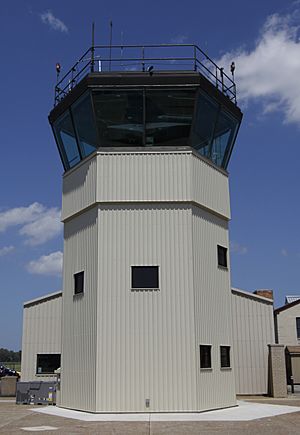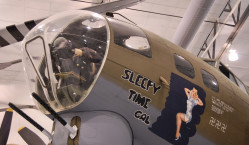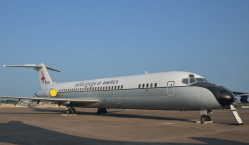Air Mobility Command Museum facts for kids

Aerial view of the museum
|
|
| Lua error in Module:Location_map at line 420: attempt to index field 'wikibase' (a nil value). | |
| Former name |
|
|---|---|
| Established | 13 October 1986 |
| Location | Dover Air Force Base |
| Type | Aviation museum |
| Founder |
|
|
Building 1301
|
|
| NRHP reference No. | 94001377 |
| Added to NRHP | 7 December 1994 |
The Air Mobility Command Museum is a cool place to visit at Dover Air Force Base in Dover, Delaware. It's a special museum all about military airplanes and their history. The museum shows how the United States Air Force has moved people and supplies around the world. It covers the story of important groups like the Air Transport Command and the Air Mobility Command.
Contents
Discovering the Museum's History
The idea for this museum started way back in 1978. Some people from the 512th Military Airlift Wing wanted to fix up an old airplane. This project was a way to train mechanics and share their work with the public.
Bringing a B-17 Back to Life
They chose a B-17G airplane called Shoo Shoo Shoo Baby. It took ten years to restore this plane so it could fly again! The original plan was to fly it to another museum. But people at Dover Air Force Base wanted to show their own history.
Starting the Museum
So, in 1986, the Dover AFB Historical Center was created. This happened on October 13. Just three days later, a C-47 airplane was flown to the new museum. This plane had been at Muir Army Airfield in Pennsylvania.
New Names and New Homes
The museum officially became a U.S. Air Force museum in 1995. Its name changed to the Dover AFB Museum. But this name didn't last long! In February 1997, it became the Air Mobility Command Museum. This change happened after the museum moved to its current home, Hangar 1301, in June 1996.
Expanding and Reopening
In 2000, the museum opened a new exhibit about the Korean War. The museum had to close to visitors in 2001. But a new road was built, and it reopened in 2003. In September 2023, the museum added a new exhibit. It teaches about Air Force Mortuary Affairs.
What You Can See: Museum Exhibits
The museum has many cool things to see. You can explore different aircraft and other special items. There's even a flight simulator where you can pretend to fly! Outside the museum, there is a special park. You can also see a retired control tower. This tower was used at Dover AFB from 1956 to 2009.
Amazing Aircraft Collection
The Air Mobility Command Museum has many old and important airplanes. These planes come from different time periods. They also represent various Air Force groups. The museum has a full set of all the important Lockheed air lifters. These planes were used by the Air Force and Army since World War II. Some of the aircraft are very special. They might be the first, last, or only one of their kind ever made.
- Beechcraft C-45G Expeditor 51-11795
- Bell UH-1N Iroquois 69-15475
- Boeing B-17G Flying Fortress 44-83624
- Boeing KB-50J Superfortress 49-0389
- Boeing KC-97L Stratofreighter 53-230
- Boeing KC-135E Stratotanker 57-1507
- Boeing-Stearman PT-17 Kaydet
- Cessna U-3 58-2126
- Convair C-131D Samaritan 55-295
- Convair F-106A Delta Dart 59-0023
- de Havilland Canada C-7A Caribou 63-9760
- Douglas A-26C Invader 44-35523
- Douglas C-47A Skytrain 42-92841 "Turf & Sport Special"
- Douglas C-54M Skymaster 44-9030
- Douglas C-124A Globemaster II 49-0258
- Douglas C-133B Cargomaster 59-0536
- Fairchild C-119C Flying Boxcar 48-0352
- Fairchild C-119G Flying Boxcar RCAF 22118
- Fairchild C-123K Provider 54-0658
- Kaman HH-43B Huskie 62-4532
- Laister-Kauffman TG-4A 42-53078
- Lockheed C-5A Galaxy 69-0014
- Lockheed C-60 Lodestar
- Lockheed C-130E Hercules 69-6580
- Lockheed C-141A Starlifter 61-2775
- Lockheed C-141B Starlifter 64-0626
- Lockheed L-1049E Super Constellation c/n 4557
- Lockheed T-33A 52-9497
- McDonnell F-101B Voodoo 59-0428
- McDonnell Douglas C-9A Nightingale 67-22584
- McDonnell Douglas KC-10 Extender 79-0433
- McDonnell Douglas VC-9C 73-1682
- Vultee BT-13 Valiant 42-1639
- Waco CG-4A 45-15009
See also




